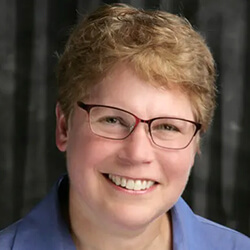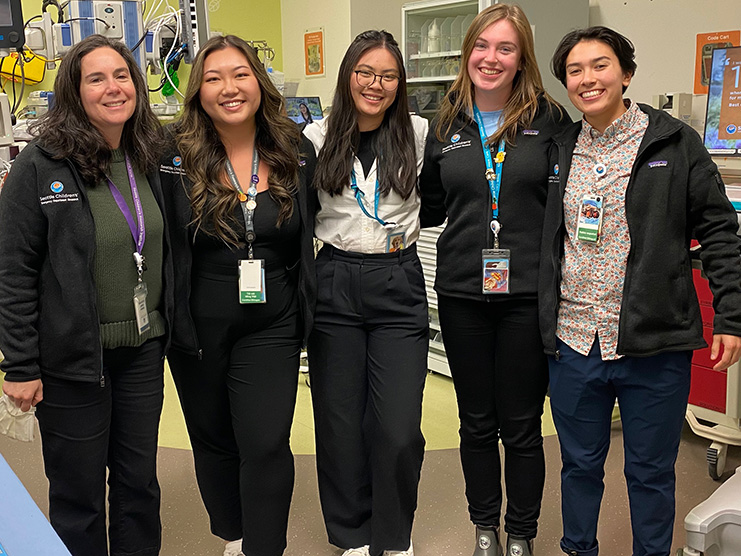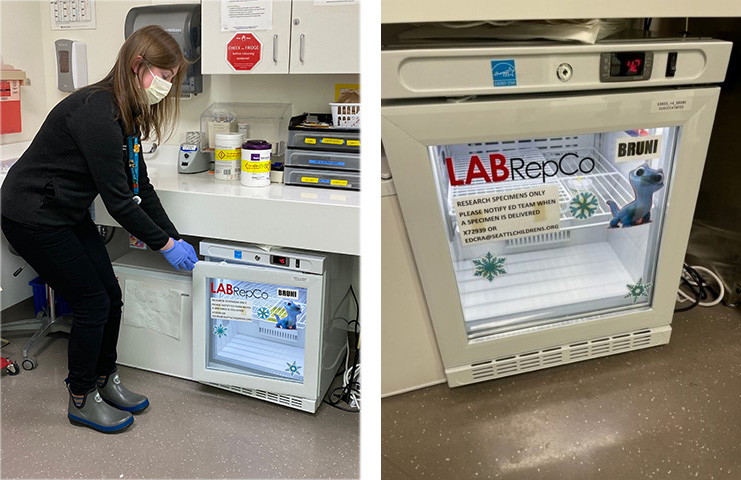 Nov. 21, 2023 – Dr. Eileen Klein, principal investigator in Seattle Children’s Research Institute’s Center for Clinical and Translational Research (CCTR) and the Seattle Children’s Emergency Department Research group were recently awarded a grant to fund ongoing research in the Pediatric Emergency Care Applied Research Network (PECARN). CCTR researcher Dr. Neil Uspal serves as the site investigator.
Nov. 21, 2023 – Dr. Eileen Klein, principal investigator in Seattle Children’s Research Institute’s Center for Clinical and Translational Research (CCTR) and the Seattle Children’s Emergency Department Research group were recently awarded a grant to fund ongoing research in the Pediatric Emergency Care Applied Research Network (PECARN). CCTR researcher Dr. Neil Uspal serves as the site investigator.
PECARN is the first federally funded national multicenter consortium that facilitates pediatric emergency care research to identify opportunities and improve outcomes for acutely injured and ill children. Through PECARN, Seattle Children’s represents children and their families in the Pacific Northwest in this national research.
A hospital’s emergency department (ED) is often the first-place patients visit when they have a health issue that can’t wait for an appointment with a primary care provider or when they have a potentially life-threatening injury or illness. Seattle Children’s ED sees more than 60,000 children per year; about 16% of those patients require admission to the hospital for further care. Many of the conditions seen through the ED are time-sensitive, making researching these conditions to improve treatment challenging.
 From left to right: Bonnie Strelitz, research manager; Cynthia Tran, clinical research coordinator II; Monet Tosch-Berneburg, clinical research coordinator I; Rebecca Wilbur, clinical research coordinator I; Talia Park, research assistant (photo taken prior to masking policy changes effective Nov. 20, 2023)
From left to right: Bonnie Strelitz, research manager; Cynthia Tran, clinical research coordinator II; Monet Tosch-Berneburg, clinical research coordinator I; Rebecca Wilbur, clinical research coordinator I; Talia Park, research assistant (photo taken prior to masking policy changes effective Nov. 20, 2023) Nevertheless, Seattle Children’s Emergency Department Research team pursues better ED care and outcomes. Consisting of a research manager, four clinical research coordinators and three research assistants, this dedicated team is funded solely by grants and is integrated into the clinical ED care environment. Being embedded in the ED provides the group the unique opportunity to conduct quality-improvement studies, ranging from which intravenous fluid works best to treat severe infections, to improving timeliness of care for children with seizures initially managed by paramedics prior to arrival.
Notably, this unique group strives to equitably reflect their research against the diverse patient population seen through the hospital. They work closely with staffed translators to include patients who prefer a language other than English for medical care, such as families who speak Spanish, Vietnamese and Chuukese.
Klein, who is also a professor in the Department of Pediatrics at the University of Washington School of Medicine, recognizes inclusion within PECARN as a special opportunity to contribute to life-changing science at a national level.
“In the emergency department, we strive to provide great care for the most acute conditions,” Klein said. “Research allows us to improve that care. Being involved in this national network will help accelerate research to support better outcomes for some of the most urgent cases.”
Within PECARN, Klein and the research team lead the Seattle-Texas-Los Angeles Research (STELAR) node. Participation in PECARN offers the STELAR group the ability to participate in NIH-funded studies, develop innovative research ideas and mentor future researchers.
 Rebecca Wilbur, clinical research coordinator, takes care to examine participant samples collected and stored within the ED. The research team is well integrated within the department to conduct timely research.
Rebecca Wilbur, clinical research coordinator, takes care to examine participant samples collected and stored within the ED. The research team is well integrated within the department to conduct timely research. Klein looks forward to supporting the next generation of research leaders interested in improving pediatric emergency care.
“We have been working for over a decade to grow our Emergency Medicine Research program to be a part of this consortium that does groundbreaking work to improve care for kids,” Klein said. “A lot of this progress couldn’t have been made without the collaboration of various departments and divisions within Seattle Children’s.”
Currently, Uspal is spearheading two large PECARN studies that focus on time-sensitive care in the emergency department. Site principal investigators Drs. Kaileen Jafari and Ron Kaplan, are also involved in this research.
In addition to the PECARN network, Klein and the ED Research team have partnered with Dr. Janet Englund and the Infectious Diseases (ID) Research team since 2009 to study potentially preventable respiratory and diarrheal illnesses as part of the Centers for Disease Control (CDC) New Vaccine Surveillance Network (NVSN). Such collaborations elevate Seattle Children’s research and improve outcomes for patients.
— Empress Rivera-Ruiz
